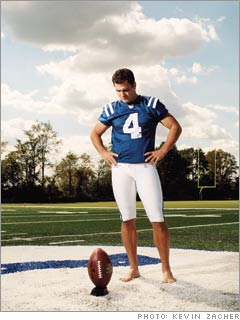Practice under the gun.
Adam Vinatieri, kicker, Indianapolis Colts
Adam Vinatieri may well be the greatest clutch kicker in NFL history. In his 11-year career, he's been to four Super Bowls with the New England Patriots--and won two with last-second kicks--and now plays for the Indianapolis Colts. His grace under pressure has earned him the nickname "Iceman." Here are his tips for staying focused while, say, 75,000 enemy fans are wishing you bodily harm--not to mention your coaches if you miss:
Stress yourself out. You can't go out and expect to do well when the pressure is on if you don't put the pressure on yourself. That means in practice, in the off-season, or when nobody else is there. Doesn't matter when it is, when I'm kicking I don't like to have a less than perfect day. In training, I always kick with my helmet on--and buckled. [Team officials even pipe in crowd noise during practice.] Not everyone [works like this], but that's my signal that I'm at work and this is business. And every training kick matters, just like it's a game. There should be no difference in intensity.
Obsess over the data. I chart kicks all throughout the season. I may do 75 kicks a day in training, a lot of which are filmed and charted. The coach sits there with a stop watch to measure the "get-off time," which is from the time the ball is snapped to the time you kick it. If you're too fast, you're out of control. Too slow, the ball gets blocked. Get-off time is an important aspect for kicking field goals. We do it in practice too, from different spots on the field. When you chart a lot of kicks you can see tendencies of what's working or what isn't. If you're less than perfect, there's a reason for it. Your job is to find it.
Love your coach. Unless you go 100 percent on all your field goals and they're all beautiful kicks smack down the middle, there's room for improvement. I'm always reviewing my kicks on film--both game and practice. I do it alone and with my coaches. Kicking is an extremely technical thing. I understand the technical aspects of how I kick, but I still need coaching. Someone on the outside looking in can see what you may be missing.
Focus your efforts. I know exactly what I need to do to help me do my job. The older I get--and let's face it, it's a young man's sport--I do a lot more stretching, including Pilates and yoga-type things. I need to be flexible to avoid injury, and for my follow-through. I don't have to run as long and as fast and as far as a receiver does. It's not my job. My job is to build fast twitch muscles so I can kick the ball far.
In my third year, I missed a 36-yard field goal against Kansas City. We were down by a point or two, and I kicked it right down the hash. It hit the upright and that was it. I was in the tank about it, but my coach told me that everyone who's great has missed a kick that cost their team the game. It's about how you respond after that. Staying even-keeled--not getting too high on the good times or too low on the bad--is what keeps you going. You must stay focused with the same intensity throughout every part of your job. -- By Ellen McGirt
Want to learn more Secrets of Greatness? Get the new book
|
|

